Strider – Review
by Richie
|
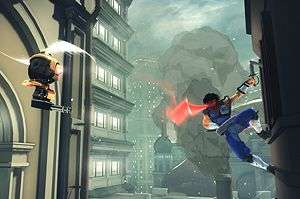 Capcom have never been a publisher that is afraid to return to the well when they have a good idea. There are currently more versions of Street Fighter out there than Dhalsim could carry, and what’s happening to the Resident Evil series is marginally more scary than being woken up by one of the Bella sisters offering you a cup of tea in bed after a very drunken night out. Strider hasn’t had that treatment though, despite being one of their most-loved classic coin-ops. A dreadful home sequel on the 8-bits and a pretty enjoyable arcade/PS1 follow-up is all we’ve had from the Strider series, which is probably why quite a few gamers have been rather excited ever since Capcom announced this game.
Capcom have never been a publisher that is afraid to return to the well when they have a good idea. There are currently more versions of Street Fighter out there than Dhalsim could carry, and what’s happening to the Resident Evil series is marginally more scary than being woken up by one of the Bella sisters offering you a cup of tea in bed after a very drunken night out. Strider hasn’t had that treatment though, despite being one of their most-loved classic coin-ops. A dreadful home sequel on the 8-bits and a pretty enjoyable arcade/PS1 follow-up is all we’ve had from the Strider series, which is probably why quite a few gamers have been rather excited ever since Capcom announced this game.
The original Strider was a platformer/hack and slasher that featured the extremely agile Hiryu, himself a ‘Strider’ which is basically a ninja who has spent too much time at PC World. In 1989, arcade characters didn’t feel like this chap. His ability to leap and somersault around the place while slicing people with his sword meant that Strider had instant appeal. Capcom were good at this: enticing you in with some sweet gameplay before shutting you down with level after level of balls-hard action. It also looked stunning back then with big, fast-moving sprites lovingly crafted in a resolution that seems to be a fair bit higher than its peers.
Now personally, I was never that fussed by Strider. I certainly didn’t hate it and I spent a fair bit of time cracking away at the ZX Spectrum conversion, but it’s not one of my top fifty coin ops. The proper arcade sequel (that I missed but did play the PS1 port of) was a lot of fun, if I remember correctly, and did a good job of making you feel like a ninja badass. Maybe too good a job as I remember it being pretty easy. But that was a long time ago and I’ve injected so much heroin since then that I wouldn’t trust those opinions.
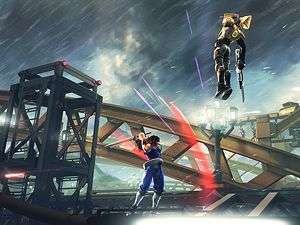 So, I’m going into Strider in neutral gear. I’m well aware of it, having neither loved nor hated it, but I still remember the impact the game had and was quite excited to get into this one. Of course, I pretty much hate PR companies so I hadn’t looked at a single bit of pre-release bumph and I have to say I was surprised pretty quickly.
So, I’m going into Strider in neutral gear. I’m well aware of it, having neither loved nor hated it, but I still remember the impact the game had and was quite excited to get into this one. Of course, I pretty much hate PR companies so I hadn’t looked at a single bit of pre-release bumph and I have to say I was surprised pretty quickly.
Rather than the linear side-scrolling slasher I was expecting, Strider is actually a fairly sprawling Metroidvania game. The Strider feel is there with Hiryu leaping and flipping around the place while doing his best to chop off peoples’ legs, and graphically it certainly looks like Strider, albeit in 2.5D as expected.
Set again in Russia (sort of) and with Grandmaster Meio being your ultimate target, the game is more of a remake than a sequel but once you’ve reacquainted yourselves with the basics of controlling Hiryu and taken out a few enemies, the differences in the gameplay between this and the original move sharply into focus.
As with any Metroidvania game, Strider sees you running and jumping in all directions trying to find the right switch to open the next area and looking for those upgrades that will help you past the myriad doors that bar entry when you first see them because you’ve not got the right upgrade equipped. It’s standard stuff and shouldn’t have been too much of a barrier to enjoying Strider but this isn’t the classic Capcom behind the code. Instead, Double Helix (whose output can only really be described as ‘the Snow Patrol of gaming’) are on coding duties here and from early on it shows.
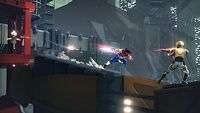 |
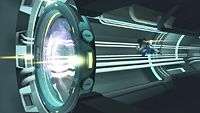 |
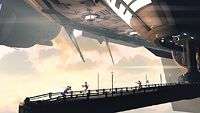 |
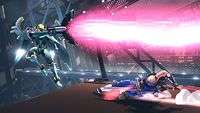 |
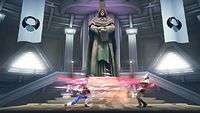 |
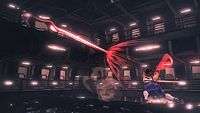 |
From the hideously angled font to the ugly fake scanlines, Strider looks like a generic XBLA game and feels cheap. Updating a game known for its striking looks can be difficult (just look at Flashback) but even by modern standards Strider looks underwhelming and, worse than that, the graphics can look a little muddled. There’s not much contrast between characters and the backdrops and, while it’s never a problem in terms of the gameplay, it just makes Strider look insipid.
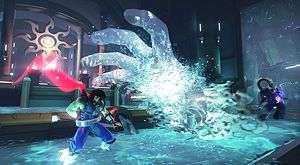 The gameplay doesn’t fare much better either. The big problem is that Hiryu’s sword has no weight to it. He slashes away, doing little damage to anything but the most basic of enemies and you never really feel it. The blade is presumably cutting through enemies like a …er… hot plasma sword through commie butter with no resistance at all, yet enemies appear unaffected until it is time to fall over. It makes the combat as satisfying as a pay-per-view boxing match between Mike Tyson in his prime and a doped Julian Clary.
The gameplay doesn’t fare much better either. The big problem is that Hiryu’s sword has no weight to it. He slashes away, doing little damage to anything but the most basic of enemies and you never really feel it. The blade is presumably cutting through enemies like a …er… hot plasma sword through commie butter with no resistance at all, yet enemies appear unaffected until it is time to fall over. It makes the combat as satisfying as a pay-per-view boxing match between Mike Tyson in his prime and a doped Julian Clary.
That’s not to say the game is unnecessarily difficult. Sure, checkpoints can be too few and far between, and some of the boss battles are a little soul-destroying but it’s really just a bit dull. As Hiryu progresses through the game, he acquires upgrades but it never really satisfies. On top of the combat, there are environmental hazards to avoid and leaps to make. Your next objective is highlighted on your map, although areas on the map are cleared as you visit them so the game doesn’t totally hold your hand there.
While I maybe didn’t get on that well with Super Metroid or Castlevania, I’m not averse to this type of game and loved Shadow Complex, Dust, and Hell Yeah, which are all nifty examples of the genre but Strider‘s take on it just bores me. That feeling of arriving in the next big area and having to start over again (while knowing that I’ve probably already passed plenty of handy collectibles) just fills me with irritation. It’s not like the environments feel any different or throw in any curveballs with the gameplay. The game just exists, not trying anything new. It feels like Double Helix were given the license and they tried to get it out of the door on time and on budget with the joyless efficiency of me at a fucking wedding.
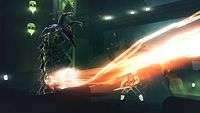 |
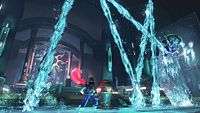 |
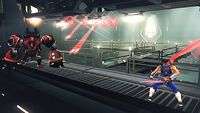 |
That’s Strider‘s problem. It has no wow moments, nothing to make you smile and no charm. It gives you the bare minimum you would expect from a Strider remake in an unnecessarily sprawling framework. It is respectful enough of the source material to please hardcore Strider fans, and if you absolutely live for Metroidvania games, you might get more out of this than me but even if you do, you’ll probably have forgotten everything about this game by the summer.
Pros- An initially authentic entry into the Strider universe
- Reasonably sound Metroidvania gameplay
- Isn't MC Strider of UK grime collective So Solid Crew
- Remarkably average gameplay that feels like work to get through
- Run of the mill graphics and character designs
- Isn't MC Strider of UK grime collective So Solid Crew
Strider is short on thrills and takes itself a little too seriously. It's been a while since I've played an Xbox Live Arcade game that feels so much like an Xbox Live Arcade game and ultimately Strider is a by-the-numbers effort that does just enough in all areas to be competent but never enough to be spectacular.
Last five articles by Richie
- The Richie Report: Et Velum Ultimum
- Sky Force Anniversary - Review
- Pac-Man Championship Edition 2 - Review
- The Final Station - Review
- Ninja Pizza Girl - Review


















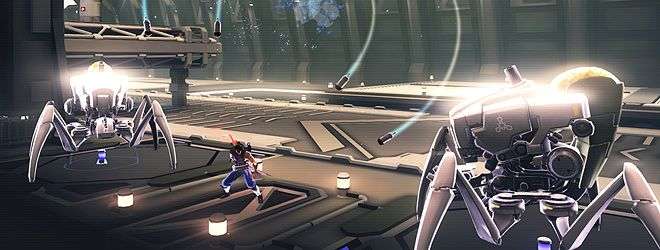
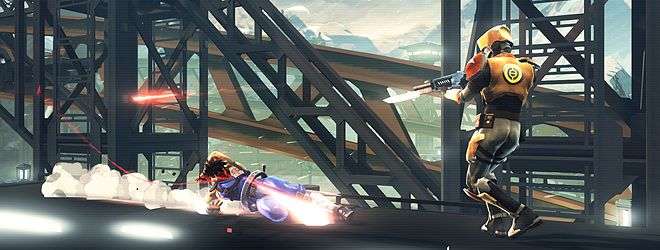






There are no comments, yet.
Why don’t you be the first? Come on, you know you want to!